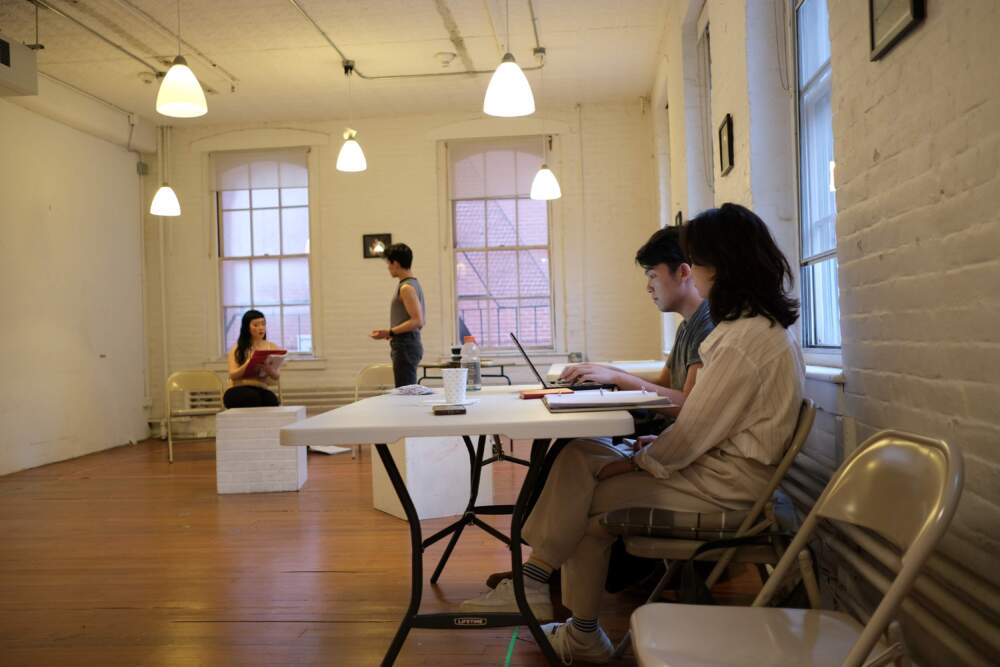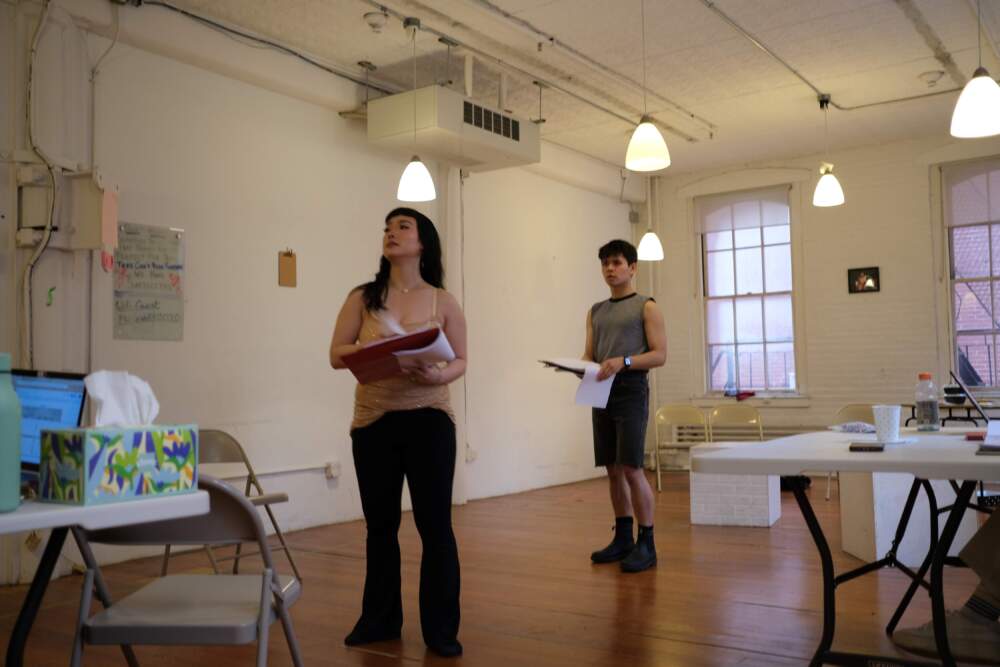Advertisement
A new play explores transracial adoption through Chinese mythology and Shakespeare

When he was growing up in China, playwright Brandon Zang often heard people talk about a child trafficking issue in which Chinese children were stolen from their families and illegally put into the domestic or Western adoption process.
“That is anxiety that I hold very intimately because I remember it so well,” Zang said.
American adoption of Chinese children has been popular in recent decades, but Zang’s awareness of the thornier side of the trend led him to research transracial adoption and examine it in his writing. The result is an adaptation of “A Midsummer Night’s Dream” that centers a transracial adoptee.
“Nüwa in Fairyland” by Zang, a Chinese Canadian playwriting MFA student at Boston University, puts a meta spin on the Shakespearean classic. Benji (Trevyn Wong) is a Chinese transracial adoptee cast as Puck in “Midsummer” at his high school. He starts channeling Puck through method acting strategies provided by his drama teacher. But in the magical world of the fairies, Benji finds himself face-to-face with Nüwa (Bowen Huang), the Chinese goddess who created humans. Through his interactions with Nüwa, Benji grapples with his racial identity and background.
The play runs May 23-June 1 at the Boston Center for the Arts’ Plaza Black Box Theatre. It’s produced by Boston-based, bilingual Asian American theater company, CHUANG Stage.
“I wanted to take something that felt canonical to Western audiences, which is ‘[A] Midsummer Night's Dream’ and Shakespeare, and combine it with something that would feel very canonical, as familiar with Chinese audiences, which I think is Nüwa,” Zang said.

The play centers on a modern teenager’s everyday life that’s preoccupied by theater, cultural differences within his white American family, and a burgeoning romance with his best friend, Damian. However, through the framework of “Midsummer,” Zang is able to mine the Shakespearean themes for parallels to the Asian American and transracial adoptee experience.
“Nüwa in Fairyland” explores how the fairies in “Midsummer” may be stealing human children, a concept that Shakespeare drew from folklore. Once Nüwa appears in this mystical landscape, Benji grapples with cultural disconnection. To Benji and his parents’ knowledge, his adoption was legitimate, but he still wonders about his heritage.
The implications of Benji meeting the creator of Chinese people was compelling to Zang because the play deals with becoming aware of your own racialization. The play is not just a coming-of-age story, it’s a “coming-of-race” story, he said.
To Wong, the fact that Benji and Nüwa are the only Asian characters is not accidental.
Advertisement
“Nüwa is coming into his life at the right time…assisting all these questions about like, what does it mean to be Asian? What does it mean to grow up in a very white-centric world?” Wong said.
The collision of worlds is also explored literally through the language. The play is bilingual, with both English and Mandarin dialogue.
That’s in CHUANG Stage’s wheelhouse. As a company started in 2018 by Emerson College graduate Alison Qu, it produces bilingual work that reflects Asian Americans’ lived experiences.
In the play, Nüwa speaks Mandarin, and there will be surtitles (translated dialogue projected onto the set) running in real time.
The production is directed by Carla Mirabal Rodríguez, the artistic and casting associate at Huntington Theatre Company. She is from Puerto Rico and is experienced working in Spanish-English bilingual theater. While she doesn’t speak Mandarin, Mirabal Rodríguez is a big proponent of the way bilingual theater challenges American audiences to experience a show they might not fully understand.
“You can glean a lot more about the story than you think you will by just watching action on a stage, seeing how people interact with each other,” Mirabal Rodríguez said. “You can hear affect no matter what the language is.”

Although the play deals with complex themes, it also has a playful tone that makes sense for the young characters. At a recent rehearsal at Boston Center for the Arts, where CHUANG Stage is completing a residency, the room was often filled with laughter.
Wong plays Benji with self-seriousness and devotion to the craft of theater. He compared Benji to the intense attitude and comicality of another young character: Rachel Berry in the Fox TV show “Glee.”
Similarly, Huang compared her character, Nüwa, to Genie in Disney’s “Aladdin,” a magical and jesting character. Huang said she was surprised by how her role could be both very poetic on the page and humorous when staged.
“When she's funny, she's really funny, but she's also this dignified goddess,” Huang said.
The tickets are “pay-as-you-are,” which allows attendees to select the price that reflects their socio-economic status. CHUANG Stage always employs this model to make its shows more accessible, especially to working-class Asian community members.
Zang said he hopes the show resonates with people of all ages, but particularly with young adults.
“I would love to invite young people's thoughts on this play,” he said, “especially for people who are currently going through some of the things that are being shown onstage.”
CHUANG Stage's production of "Nüwa in Fairyland" runs at the Boston Center for the Arts’ Plaza Black Box Theatre May 23-June 1.